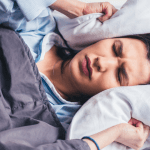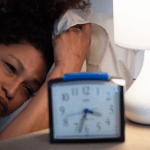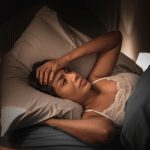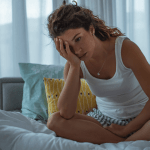Insomnia and Conventional Treatments
Insomnia, a common sleep disorder, affects a significant portion of the population, leading to difficulties in falling asleep, staying asleep, or experiencing restorative sleep. The impact of insomnia extends beyond nighttime distress; it can impair cognitive function, mood, and overall quality of life. Chronic insomnia is associated with an increased risk of developing mental health disorders, cardiovascular diseases, and metabolic issues.
Cognitive Behavioral Therapy (CBT) for Insomnia
Cognitive Behavioral Therapy for Insomnia (CBT-I) is a structured program that helps individuals identify and replace thoughts and behaviors that cause or worsen sleep problems with habits that promote sound sleep. Unlike medication, CBT-I addresses the underlying causes of insomnia. The therapy involves techniques like stimulus control, sleep restriction, and relaxation exercises, and it has been shown to be an effective first-line treatment for chronic insomnia.
Medications as Add-On Therapy: Risks and Considerations
When behavioral interventions like CBT-I are insufficient, medications may be used as add-on therapy. These include over-the-counter (OTC) sleep aids, prescription hypnotics, and antidepressants with sedative properties. While these medications can provide short-term relief, they come with risks such as tolerance, dependence, and withdrawal symptoms. It is crucial to consider the potential for side effects and interactions with other medications.
The Role of Healthcare Professionals in Managing Insomnia
Healthcare professionals play a pivotal role in managing insomnia. They conduct thorough assessments to rule out underlying conditions, provide education on sleep hygiene, and determine the most appropriate treatment plan. This may involve a combination of behavioral therapy, pharmacological interventions, and lifestyle modifications tailored to the individual’s needs.
Menopause can be a stressful time, but managing stress is key to reducing symptoms like hot flashes and mood swings. Techniques such as deep breathing exercises, progressive muscle relaxation, and mindfulness meditation can be effective. Cognitive-behavioral therapy (CBT) has also been shown to improve psychological well-being. Engaging in hobbies, maintaining social connections, and seeking support from peers or professionals can further aid in managing stress during menopause.
Overview of Medications for Insomnia
Prescription Medications and Their Subcategories
Insomnia, a common sleep disorder, can significantly impact an individual’s quality of life. To manage this condition, healthcare providers often prescribe medications that fall into several categories. Benzodiazepines, such as lorazepam and temazepam, are sedatives that can help with sleep onset and maintenance but may lead to dependence. Non-benzodiazepine hypnotics, including zolpidem and eszopiclone, target the same receptors with potentially fewer side effects. Antidepressants like trazodone and doxepin are also used, particularly when insomnia coexists with depression. Lastly, melatonin receptor agonists such as ramelteon regulate the sleep-wake cycle with minimal risk of abuse.
Over-the-Counter (OTC) Medications and Potential Risks
OTC medications for insomnia typically include antihistamines like diphenhydramine and doxylamine. While these can be effective for short-term use, they may cause daytime drowsiness, cognitive impairment, and tolerance over time. It’s crucial for patients to understand the potential risks and to use these medications judiciously.
Dietary Supplements and Herbal Remedies
Many individuals turn to dietary supplements and herbal remedies for a more natural approach to managing insomnia. Valerian root and melatonin supplements are among the most popular, with varying degrees of scientific support for their efficacy. These remedies are generally considered safe for short-term use, but long-term effects and interactions with other medications need further study.
Unapproved Prescription Medications and Off-Label Use
Some prescription medications not specifically approved for insomnia are used off-label to promote sleep. These include certain antipsychotics and anticonvulsants. Off-label use should be approached with caution, as the safety and efficacy for insomnia have not been thoroughly vetted by regulatory agencies.
In conclusion, a range of pharmacological options exists for the treatment of insomnia, each with its own benefits and drawbacks. It is essential for healthcare professionals to tailor treatment plans to individual patient needs, considering the potential risks and benefits of each medication.
The Science Behind Sleep-Inducing Medications
How Different Medications Facilitate Sleep
Sleep-inducing medications, commonly known as hypnotics, work by influencing the central nervous system to promote drowsiness and facilitate the onset of sleep. These medications can be broadly categorized into benzodiazepines, non-benzodiazepine hypnotics, melatonin receptor agonists, and various off-label medications such as certain antidepressants and antihistamines. Benzodiazepines, like temazepam, enhance the effect of the neurotransmitter gamma-aminobutyric acid (GABA), which has inhibitory effects on the brain, leading to sedation. Non-benzodiazepine hypnotics, including zolpidem and eszopiclone, also target GABA receptors but have a different chemical structure and are thought to have fewer side effects. Melatonin receptor agonists, such as ramelteon, mimic the action of melatonin, a hormone that regulates the sleep-wake cycle, thereby aiding in sleep induction.
The Role of Neurotransmitters in Sleep Medications
Neurotransmitters play a pivotal role in the mechanism of action of sleep medications. GABA, the primary inhibitory neurotransmitter in the central nervous system, is a key target for many hypnotics. By increasing GABA activity, these drugs enhance its calming effects, which can help to reduce anxiety and induce sleep. Melatonin, another crucial neurotransmitter for sleep regulation, is synthesized in the pineal gland and its levels rise in response to darkness, signaling the body that it is time to sleep. Medications that act as melatonin receptor agonists effectively mimic this natural process, making them useful for treating sleep disorders like insomnia and jet lag.
Potential Side Effects and Long-Term Risks
While sleep-inducing medications can be effective in the short term, they are not without potential side effects and risks. Common side effects include dizziness, headache, gastrointestinal disturbances, and next-day drowsiness, which can impair cognitive function and motor skills. Long-term use of these medications can lead to tolerance, dependence, and withdrawal symptoms upon discontinuation. Additionally, there is a risk of complex sleep-related behaviors, such as sleepwalking or sleep driving, particularly with non-benzodiazepine hypnotics. It is important for healthcare providers to carefully consider the benefits and risks of these medications and to monitor patients for any adverse effects.

The Debate on Herbal and Dietary Supplements for Sleep
Efficacy and Safety of Herbal Sleep Aids
Herbal sleep aids have been used for centuries as natural remedies for insomnia and other sleep disorders. These remedies include a variety of herbs such as valerian root, chamomile, lavender, and hops. The efficacy of these herbal sleep aids is often supported by anecdotal evidence and traditional use, but scientific research on their effectiveness is mixed. Some studies suggest that certain herbal supplements can improve sleep quality and reduce sleep latency, while others find no significant benefits compared to placebos.
When it comes to safety, most herbal sleep aids are considered safe for short-term use in adults. However, potential side effects such as daytime drowsiness, dizziness, and gastrointestinal issues have been reported. Additionally, the lack of regulation in the dietary supplement industry can lead to inconsistencies in product quality and potency, raising concerns about the reliability of these remedies.
The Case of Hops and Its Sleep-Inducing Properties
Hops, the flowers of the Humulus lupulus plant, are commonly known for their role in beer production. However, they have also been traditionally used to induce sleep. The sedative effects of hops are attributed to the compound 2-methyl-3-buten-2-ol, which is formed from the bitter acids found in the plant. Research has shown that non-alcoholic beer containing hops can improve sleep quality, suggesting that the sleep-inducing properties of hops are not solely due to the alcohol content in beer.
Furthermore, hops contain a potent phytoestrogen known as 8-prenylnaringenin, which may interact with estrogen receptors in the body and contribute to the regulation of sleep. Despite these findings, more research is needed to fully understand the mechanisms by which hops influence sleep and to determine the optimal dosage and preparation for sleep support.
Interactions and Contraindications of Herbal Remedies
Herbal remedies can interact with prescription medications, over-the-counter drugs, and other supplements, potentially leading to adverse effects or reduced efficacy of treatment. For instance, sedative herbs like hops may enhance the effects of sleep medications or other central nervous system depressants, increasing the risk of excessive sedation.
Contraindications for the use of herbal sleep aids also exist. Individuals with certain medical conditions, such as liver disease, autoimmune disorders, or hormonal-sensitive conditions, should exercise caution or avoid certain herbs altogether. Pregnant or breastfeeding women and children are also advised to consult healthcare professionals before using herbal sleep aids due to the limited data on safety in these populations.
In conclusion, while herbal and dietary supplements like hops may offer potential benefits for sleep, their use should be approached with careful consideration of their efficacy, safety, interactions, and contraindications. Personalized treatment plans and consultation with healthcare providers are essential to ensure the safe and effective use of these natural remedies.

THEN IT CONTAINS TOXIC CHEMICALS. WHY RISK IT GETTING SICK? GO CHEMICAL FREE.
Challenges in Treating Insomnia with Medication
Addressing Chronic Insomnia and Associated Health Conditions
Chronic insomnia often coexists with various health conditions, complicating treatment strategies. It is not merely a symptom but a disorder that can exacerbate comorbidities such as depression, anxiety, and cardiovascular diseases. Healthcare providers must adopt a holistic approach, considering the multifaceted nature of insomnia and its potential to both influence and be influenced by other health issues. The interplay between chronic insomnia and associated conditions necessitates a comprehensive treatment plan that addresses all underlying factors.
Medication Dependency and Withdrawal Concerns
One of the most significant challenges in using medication to treat insomnia is the risk of dependency. Patients may become reliant on sleep medications, particularly those in the benzodiazepine class, to achieve restful sleep. This dependency can lead to a cycle of long-term medication use and withdrawal concerns, where discontinuing the drug results in a rebound of insomnia symptoms, often more severe than the original sleep disturbances. Healthcare professionals must carefully monitor medication use, considering non-pharmacological interventions to minimize the risk of dependency and withdrawal.
Balancing Medication Benefits Against Risks
While medications can provide immediate relief for insomnia, they are not without risks. Side effects such as daytime drowsiness, cognitive impairment, and potential interactions with other medications must be weighed against the benefits. Patients and healthcare providers must engage in a dialogue to determine the most appropriate course of action, considering factors such as the severity of insomnia, patient history, and the presence of comorbid conditions. The goal is to achieve a balance where the therapeutic benefits justify the potential risks associated with medication use.
In conclusion, treating insomnia with medication presents several challenges that require careful consideration. Addressing the complexity of chronic insomnia, avoiding medication dependency, and balancing the benefits against the risks are crucial components of effective insomnia management. As research progresses, the hope is to refine treatment strategies that offer relief while minimizing adverse effects, ultimately improving the quality of life for those affected by this pervasive sleep disorder.
Non-Pharmacological Strategies and Lifestyle Adjustments
Behavioral and Environmental Changes to Improve Sleep
Creating a conducive sleep environment and adopting healthy behavioral practices are essential for improving sleep quality. Establishing a regular sleep schedule by going to bed and waking up at the same time each day can significantly enhance sleep patterns. Creating a bedtime routine that may include reading or relaxation exercises can signal to the body that it’s time to wind down. It’s also important to optimize the sleep environment by ensuring the bedroom is dark, quiet, and cool. The use of blackout curtains, earplugs, or white noise machines can be beneficial for those sensitive to light and sound.
Diet, Exercise, and Sleep Hygiene
Diet and exercise play a pivotal role in sleep quality. Consuming a balanced diet with an emphasis on foods rich in tryptophan, magnesium, and melatonin such as cherries, bananas, and almonds can promote better sleep. It’s advisable to avoid heavy meals, caffeine, and alcohol close to bedtime as they can disrupt sleep. Regular physical activity enhances sleep quality, but it should be done several hours before bedtime to avoid stimulation that can interfere with falling asleep. Good sleep hygiene also includes limiting naps, especially late in the day, and reducing exposure to screens before bedtime due to the blue light emitted, which can suppress melatonin production.
Regular Monitoring and Follow-Up with Healthcare Providers
Consistent monitoring of sleep patterns and regular consultations with healthcare providers can help identify and address sleep issues. Keeping a sleep diary can be a useful tool for tracking sleep habits and disturbances, which can then be discussed with a healthcare professional. It’s important to review and adjust sleep strategies based on effectiveness and to rule out underlying conditions that may be contributing to sleep problems. Healthcare providers can also offer guidance on behavioral therapies such as Cognitive Behavioral Therapy for Insomnia (CBT-I), which has been shown to be an effective non-pharmacological treatment for insomnia.
By the way, something for you, a little gift!!!
I am just in the middle of publishing my book. It’s about How women can balance their hormones. One part is about food and diet, of course.
Follow this link and enter your email.
I will send you this part of the book for free once the book is published. It has many concrete, practical tips and recipes and will help you feel better during menopause or times of Big hormonal fluctuations.
Annette, Damiva Lead for Health & Wellness

Conclusion: Integrating Hops and Other Remedies into Sleep Management
Summarizing the Role of Hops in Sleep Support
The journey of Humulus lupulus, commonly known as hops, from the annals of brewing to the realm of sleep support, has been both historical and scientific. Traditionally, hops have been associated with sedative properties, a notion that has been supported by modern research. Studies have suggested that certain compounds in hops, such as humulone and lupulone, may contribute to improved sleep quality by exerting a calming effect on the central nervous system. While not a standalone solution for sleep disorders, hops have shown potential as a complementary aid in managing sleep-related issues when used in conjunction with other natural remedies or behavioral strategies.
The Importance of Personalized Treatment Plans
When considering the use of hops for sleep support, it is crucial to emphasize the importance of personalized treatment plans. Individual responses to herbal remedies can vary greatly, and what works for one person may not be effective for another. Healthcare providers can help tailor a sleep management plan that takes into account the patient’s specific needs, medical history, and any potential interactions with existing medications. This personalized approach ensures that the use of hops, whether in the form of teas, extracts, or supplements, is both safe and beneficial for the individual seeking better sleep.
Future Directions in Sleep Medicine and Research
The exploration of natural remedies like hops is indicative of a broader trend in sleep medicine towards integrating holistic approaches with conventional treatments. Future research is poised to delve deeper into the mechanisms by which hops and other herbal remedies influence sleep. Clinical trials with larger sample sizes and diverse populations are needed to validate the efficacy of hops in sleep support. Additionally, the development of standardized dosages and formulations will be essential for the safe and consistent use of hops in clinical practice. As the field of sleep medicine continues to evolve, the integration of traditional wisdom with scientific innovation holds promise for the advancement of effective and natural sleep therapies.
In conclusion, while hops have a storied history as a natural sleep aid, their role in contemporary sleep management is still being defined. The integration of hops into sleep strategies should be done thoughtfully, with consideration for individual differences and in consultation with healthcare professionals. As research progresses, the potential for hops to contribute to the tapestry of sleep solutions will become clearer, offering hope for those seeking restful nights through natural means.









